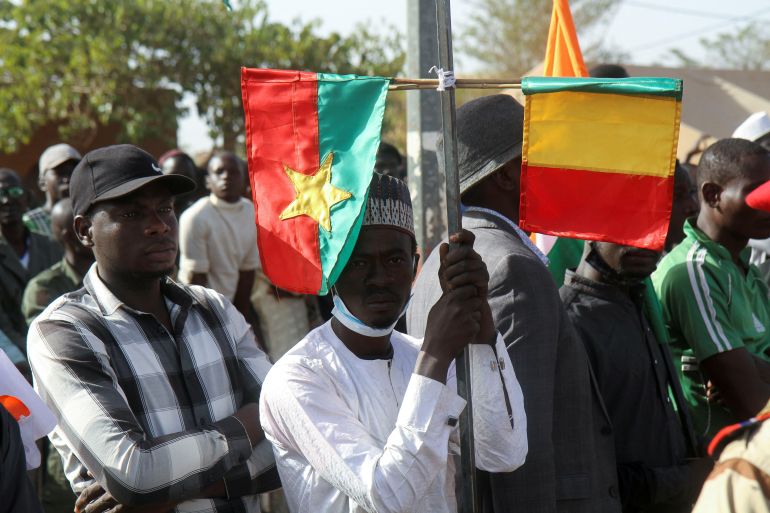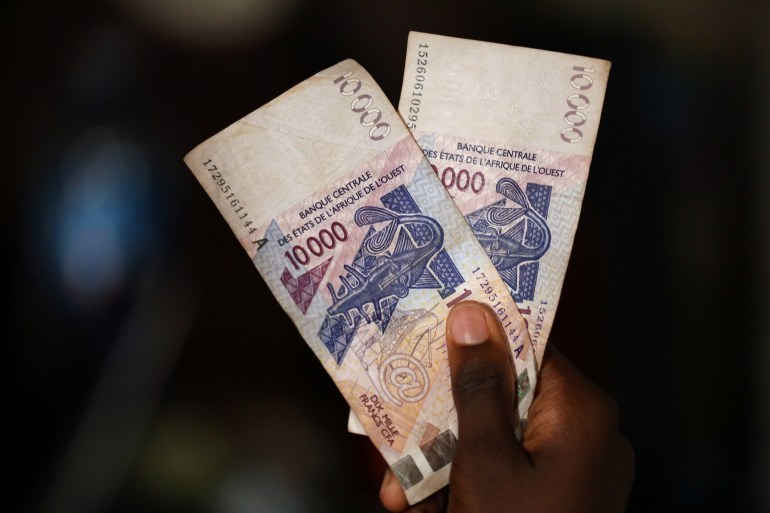Debate on ditching CFA begins as Burkina Faso, Mali, Niger forge new path
Amid talk of ditching the West African franc, a colonial-era legacy, analysts unpack what it means for the three troubled Sahel states.

Abidjan, Ivory Coast – Since Niger’s July 30 coup, fissures within the Economic Community of West African States (ECOWAS) have become bigger.
In September, Niger along with fellow ECOWAS members Burkina Faso and Mali formed a military alliance called the Association of Sahel States (AES). Four months later, the trio announced their withdrawal from the larger bloc for “illegal, illegitimate, inhumane and irresponsible sanctions” it imposed on them after coups.
This month, reports emerged of a possible parting with their currency, the West African franc (CFA).
“Perhaps everything we’ve done has surprised you, hasn’t it?” Captain Ibrahim Traore, leader of the Burkinabe transitional government, said in an interview in February. “More changes might still surprise you. And it’s not just about currency. We will break all ties that keep us in slavery.”
Within days, his Nigerien counterpart, Abdourahmane Tchiani, confirmed that a major monetary shake-up could be in the offing. “Currency is a sign of sovereignty. … The AES member states are engaged in the process of recovering their full sovereignty. It is no longer acceptable for our states to be France’s cash cow,” he said in an interview with the state broadcaster.
Their statements made headlines across a continent where criticism of the continued use of the CFA, a remnant of the French colonial system, is on the rise.
While there is no word on when the planned change will happen or if indeed it will, the desire to change the currency seems to not be uniform yet among the three countries.
“It should be noted that Mali remains a member state of the UEMOA,” the West African Economic and Monetary Union, Economy and Finance Minister Alousseni Sanou said on Monday in a broadcast on Mali’s national television while presenting the annual budget.
One of the country’s prominent businessmen grinned wryly as he watched.
The entrepreneur who spoke on the condition of anonymity to protect his business operations in Mali and Senegal believes the new Sahel alliance is not as cohesive as it has claimed to be.
“Niger’s military coup happened some seven months ago, ” he told Al Jazeera. “I think Malian and Burkinabe leaders have been grappling with the realities of governing for longer and aren’t as spirited as they once were, … at least not when it comes to the UEMOA evidently.”

A measure of stability?
France created the CFA in 1945 as a currency for its African colonies. Indeed, the acronym CFA initially stood for “Colonies Francaises d’Afrique” (French Colonies of Africa). This system provided France with significant economic and political influence over its African territories because it maintained control over the currency’s convertibility and monetary policy.
The colonies gained independence in the 1960s and ’70s, but many clung to the currency, which is now named “Communaute Financiere Africaine” (African Financial Community).
Eight members of UEMOA – Benin, Burkina Faso, Ivory Coast, Guinea-Bissau, Mali, Niger, Senegal and Togo – still use the CFA. An equivalent currency, the Central African franc (also called the CFA) is being used by the six member states of the Economic and Monetary Community of Central Africa: Cameroon, the Central African Republic, Chad, Republic of Congo, Equatorial Guinea and Gabon.
Only Equatorial Guinea and Guinea-Bissau are not former French colonies, having been subjugated by Spain and Portugal respectively.
For years, the CFA was trumpeted by government officials as a mechanism for promoting monetary stability, facilitating economic integration, and enhancing overall economic performance.
Then coups occurred, and anti-French sentiments increased.
Since 2020, there have been six successful coups in West Africa, all in UEMOA states. The military took power during a time of rising insecurity in these countries. It then accused French forces of not doing enough in their collaborations to fight armed groups.
As relations soured and states in the region turned to new partners like Russia, calls for cutting ties with France and instituting a new currency have grown louder.
Supporters of the CFA say being pegged to the euro is a useful buffer against inflation, given the state of economies in the Sahel. Together, Burkina Faso, Mali and Niger contribute only about 8 percent of the $761bn gross domestic product (GDP) of ECOWAS.
Far bigger economies like Nigeria and Ghana have struggled with recessions in recent years as the value of their currencies – the naira and cedi, the world’s weakest currency in 2022, according to Bloomberg News – continued to plummet.
But the counterargument from the CFA’s critics is that using the perceived failure of some African monetary policies as an indicator of how replacement currencies would behave stems from outdated and reductive monetary doctrines.
One of them is Senegalese economist Ndongo Samba Sylla, who is head of research and policy for Africa at International Development Economics Associates. He said the CFA was created not for the benefit of African states but for France to protect itself against the rise of the United States dollar.
The famed stability of the CFA, he said, is artificial because the benchmark is external.
“From a purely practical economic standpoint, the CFA is not a beneficial currency or system for its user states,” he told Al Jazeera.
“Long-term analysis of the GDP per capita indicator, which is used to assess income growth per person, proves that countries that have used the CFA since their independence have not recorded the development that they should have,” Sylla said. “For example, Ivory Coast, the most economically significant country among the 14 nations of the CFA zone, reached its income per capita peak in 1978. Similarly, Niger, which experienced a military coup in 2023 and has recently decided to withdraw from the Economic Community of West African States recorded its highest income per capita in 1965. The list goes on.”
He noted that the CFA being pegged to the euro is detrimental to oil-producing African states because the commodity is priced and traded in US dollars, a practice that dates back to the 1970s when the petrodollar system was established.
To reform or to renounce?
In previous years, there has been talk of ending the currency system or at least reforming it.
The most recent – and consequential – one happened after a December 2019 joint proclamation by Ivorian President Alassane Ouattara and his French counterpart, Emmanuel Macron, that the CFA as it had existed until then was no more. Two years of negotiations with the UEMOA member states followed with Paris eventually loosening its grip on the West African franc.
The Central Bank of West African States is no longer required to deposit half of its foreign exchange reserves with the French Treasury, an obligation that critics of the currency have long denounced as a humiliating attachment to France. Before the reform, the central bank’s governor and the French finance minister met twice annually.
Those reforms went largely unnoticed by mainstream society.
“The system has evolved, but it remains misunderstood by a lot of pundits and the public,” Mao Makalou, a Malian economist and former presidential adviser, told Al Jazeera.
He said the operating account that held part of the foreign reserves of UEMOA states provided stable profits for its members, which ended with the reform.
The West African central bank “tried to invest its foreign exchange reserves, which were previously paid at the interbank rate, and its profits decreased. It was more profitable in this operating account, which was a standard current account,” Makalou said.
But he also admitted that the currency’s origins are tainted, which is why many are calling for it to be discarded. “You have to take the political environment into account,” he added. “We know that the UEMOA community is tied to France through a monetary cooperation agreement that includes an exit clause. It is, therefore, up to the member states to leave this system if they consider it disadvantageous. But we have to remain pragmatic.”
For the governments in these Sahel countries, the definition of pragmatism may differ from that of economists.
In the face of sanctions imposed by ECOWAS on the three Sahel countries and supported by the European Union, Niger appears to have embarked on the most radical route.
In October, the military government announced a 40 percent cut in the national budget. Aid previously accounted for up to 60 percent of its budget funding.
The ECOWAS sanctions prevented Niger from accessing the UEMOA regional financial market to finance its budget and conduct banking transactions. It has also missed several repayment deadlines as its external debt stands at 14.5 billion Central African francs ($519m) as of this month.
“With everything Niger has been going through, I understand Tiani’s position,” Makalou told Al Jazeera. “It’s one thing to impose sanctions targeted at the military leader but to create such economic and social chaos? Medicine has run out. The borders have closed. It’s indiscriminate. And it’s giving reasons to the government to push regional integration to the side and find other alternatives to govern. I don’t see what other choice he has.”